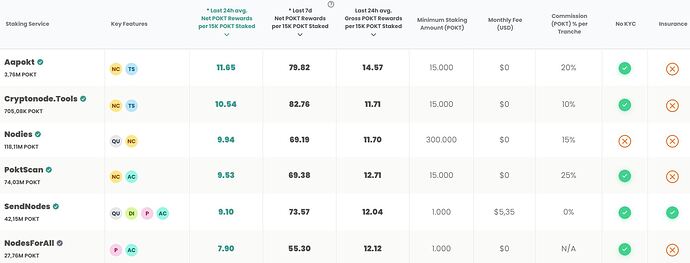Attributes
-
Author: RayBorg
-
Title: An open open discussion about improving the node-runners cost-efficiency, decreasing the market sell pressure and increasing the network security by educating community on the importance of non-custodial feature
-
Related PUPs: PUP-31 and PUP-27 (I will explain later the connection with the proposals)
Summary
Pointing out to all members of the POKT community about the importance of running the most efficient and least expensive nodes, while at the same time keeping the private keys themselves (not your keys, not your coins). Expensive and inefficient node-running is reflecting all POKT investors in a way similar to an additional taxation. Moving away from expensive node-running service providers towards more efficient and cheaper node-running service providers is beneficial for everyone in the POKT community and all the investors in every possible way.
A list of node-running service providers is publicly available at CompareStakingServices .
They are sorted by the profitability calculated after deducting the charges by each of the service providers. For example, the following data shows that Aapokt is leading past 24 hours with a net POKT rewards of 11.65 POKT per 15k POKT staked (clean profit after paying the service costs).
Abstract
Pocket Network managed to strongly cut down network expenses during the past few months, but there is still a lot of room for improvements. Network is still not in a good shape which doesn’t allow much space for a price to start recovering. This is an educational post for community to raise awareness of many facts that majority is aware of, but didn’t think about them thoroughly.
Motivation
Expensive node-running offered by most expensive and least efficient service providers are directly harming all the POKT investors considering the excessive market sell pressure which can be mitigated to large degree by educating community that more efficient node-running helps everyone in the POKT community, including themselves.
A list of key points and constructive suggestions that would work in everyone’s favor and for everyone’s benefit
-
PUP-27 should pass to give people an opportunity to consolidate further. Furthermore, PUP-27 passing would also force 15k servicers that are running their nodes at expensive providers to become even less profitable so all of the inefficient node-runners would be forced to shut down their nodes or switch to more efficient service providers. It would result with significant reduction of market sell pressure, ensuring more POKT goes to investors pockets rather than node-runners that are charging high fees.
-
It’s massively important that PUP-31 gets implemented so that investors can switch from inefficient/expensive service providers to most efficient service providers. Introducing more competition among service providers serves as the most efficient tool for lowering the profit margins of service providers.
As of right now, many investors hesitate to change provider because they don’t want to wait for 21 days and lose all of the rewards during that time, remaining at inefficient service providers. -
The importance of non-custodial staking feature should stand out even above profitability itself. It’s what real crypto is all about. You don’t give away your private keys to anyone, especially not the random people you never met in real life nor know who they are. Even if there’s an insurance in place, it’s anti-crypto to give away your private keys to anyone. Majority should be their own bank, storing their own private keys safely.
This is also important in a way that concentrating a lot of POKT in big service providers possess a huge security risk which is hard to handle. Everyone is hoping that service providers have taken all the security measures according to the highest security standards. In case of a hack of some of the biggest service providers, 100 million POKT would possibly get dumped on the market at the same time, causing the immediate death of the Pocket Network project. It’s very important to educate community on the risks of such possibilities. Furthermore, while anyone possess private keys of millions of POKT, it opens up a space for potential unethical activities. -
All the suggestions above including PIP-31 are promoting the decentralization, which would be supported as much as possible. More unique people would hold their own private keys and being less reliant on centralized entities.
-
It’s a fact that node-runners are still being able to take advantage of a situation that node-running is an overly complex process for an average person to run their own node(s). I’m also among them and I never ran a single node myself but used the most famous node service providers and now moved to small node runners like aapokt.com or cryptonode.tools (they can be found here: https://comparestakingservices.com/ ). It’s even more important that both of them provide 100% non-custodial staking feature so private keys are safely stored by the real owner. Running with them is easy because they also offer an easy step-by-step tutorial how to stake in a secure and 100% non-custodial way.
There are many other points that can be done here, but this is certainly a good start for a hopefully very constructive discussion. I hope this post will raise some questions and serve as a central place for people to discuss an option to use non-custodial staking, compare the quality of various node-running service providers and many other questions that newcomers might have. Goal is to help making node-running process as smooth as possible.
Copyright
Copyright and related rights waived via CC0.
